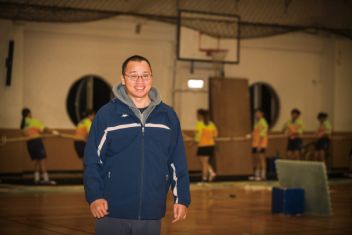
A Kurd in Taiwan—Zanst Othman (photo by Jimmy Lin)
Even though the Kurdish people, like the Taiwanese, live in Asia, talk of them often stays focused on stereotypes like war, refugees, terrorist attacks, and ethnic cleansing. Zanst Othman, who comes from Iraq’s autonomous Kurdistan Region and married a woman from Taiwan, has written a book about his homeland based on first-hand experiences. Not only does it overturn prejudices, but it also amazes readers by showing how similar Taiwan and Kurdistan really are after all.
It is more crowded than usual on Taipei’s Dihua Street as the Lunar New Year approaches. Zanst Othman, with his bushy eyebrows and curly hair, stands out from the crowd. Walking alone through the tide of people, he looks perfectly self-composed. After all, over the past 12 years he has spent far more time in Taiwan than in his homeland, the autonomous Kurdistan Region in northern Iraq.
Online romance
Even given the convenient transportation of the present day, Taiwan is still quite far from the Kurdistan Region, and you have to change planes several times to travel between them. Furthermore, Taiwan has no representative office in Iraq, so it is impossible to get a Taiwan tourist visa there. If you want to come to Taiwan, the only ways to obtain a visa are by coming to study, to attend a conference, to visit family, or at government invitation. And there is only one reason why Othman overcame all obstacles and fought to get the chance to come to Taiwan: the powerful motivation of love.
Ten-plus years ago, Othman, then living in the Kurdistan Region’s second-largest city, Sulaymaniyah, tried to find strangers to talk to online because he wanted to improve his English, and as a result he met his future wife, Hsu Chia-hua.
This Internet love story, which in Hsu’s words “startled everyone,” brought Othman, who at that time had no passport and had never been abroad, to Taiwan. Over the last 12 years, he has set down roots here, getting married, having a son, and learning Chinese. He has even earned a master’s degree in international politics from National Chung Hsing University. From being a foreigner he has formally become a Taiwanese.
Nomadic herders sitting on oil
Othman, who has been in Taiwan for many years, often encounters people here who think that he is lucky to have been able to escape a war-torn and poverty-stricken area and come to Taiwan. It’s hard for most Taiwanese to imagine that his hometown is a beautiful mountain city that has been called the ”Paris of Iraq.” Having neither desert nor camels, it enjoys four distinct seasons, with flowers blooming riotously in spring and snowfall in the winter.
In fact, the Kurds, originally nomadic herders, have been living in the Mesopotamian Plain longer than any other ethnic group. They have more than 3000 years of history, with their own culture and language, and their population in excess of 30 million makes them the fourth largest ethnic group in the Middle East. However, this ethnic group, which is known internationally for being nomadic herders living in oil-rich areas, has suffered greatly precisely because of their rich natural resources. After World War I, because of complex international political factors, the Kurds were unable to establish their own independent country, and today they are scattered across a number of nations including Turkey, Syria, Iran, and Iraq. They are the largest ethnic group in the world without their own state.
Othman did experience a period of war when he was a child. But following the end of the Persian Gulf War, with the support of the US government the Iraqi Kurds established a de-facto independent government in northern Iraq in 1991. Their autonomy was recognized in the 2005 Iraqi constitution, which permits the Kurds to have their own popularly elected president, military, and budget. With the arrival of peace, Iraqi Kurdistan’s economy took off, so that in comparison with the past it has become an entirely different place.

Co-authored by Zanst Othman and Chen Fong-yu, The Courage of the Kurds: The Kurdish People and Their Pursuit of Independence introduces Othman’s homeland to Taiwanese readers from an insider’s perspective. (photo by Jimmy Lin)
The first Chinese popular history of the Kurds
Othman finally acquired a visa to come to the unfamiliar land of Taiwan in 2009. As a foreign spouse, his first task was of course to learn Chinese. Later, through Hsu Chia-hua’s connections he got to know Chen Mu-min, then a professor in the Graduate Institute of International Politics at National Chung Hsing University and currently Taiwan’s deputy representative in India. The Kurds were then in the news because of clashes with ISIS, and Chen, who always enjoyed having people from different countries come to his class and give lectures, not only invited Othman to do so, but recruited him as a student.
All the while, Othman steadily improved his Chinese and even wrote his master’s thesis on political development in the Kurdistan Region in Chinese.
Chen Mu-min, who was Othman’s advisor, considered the thesis to be a valuable first-hand study of the Kurds, and thought it would be a waste if the research were just to be stored away in the ivory tower of academia. Therefore he encouraged Othman and his own wife Chen Fong-yu to rework the thesis, weave into it Othman’s transnational love story, and produce the book The Courage of the Kurds: The Kurdish People and Their Pursuit of Independence, which has been called the first popular history book written in Chinese on the Kurdish people.
The book discusses in detail the history of the long-standing and contentious relations between the Kurds and their neighbors. It also gives a Kurdish perspective on the Iran‡Iraq War, the Persian Gulf War, Saddam Hussein’s genocidal campaigns, and American economic sanctions, and describes the frustrations encountered by the Kurdish people in recent years in their pursuit of independence and their reflections on this process.
Paths to development
When Othman recalls his early conversations with Hsu Chia-hua, besides exchanging details of their daily lives in halting English and working through differences, “the topic that touched us most deeply was how amazingly similar the fates of the Taiwanese and the Kurds are after all,” he says.
Due to similarly complex historical legacies, both the Taiwanese and the Kurds are still struggling to gain international recognition today. They are also similarly oppressed by neighboring major powers and are searching for recognition from the international community. Moreover, both are optimistic, passionate, and family-oriented peoples.
Although Othman has long since moved away from home, when talk of his homeland comes up you can still sense his profound feelings about his people. Having traveled back and forth continually between the two places over these past years, he hopes to bring to bear his unique experience and build a bridge of friendship between Taiwan and Kurdistan, so that the people of the two lands can share their experiences and learn from each other.











